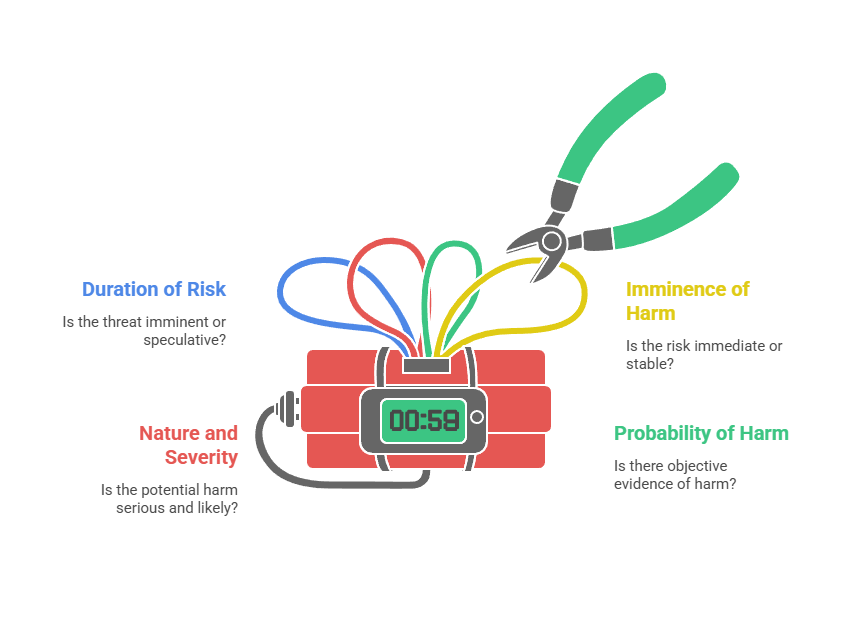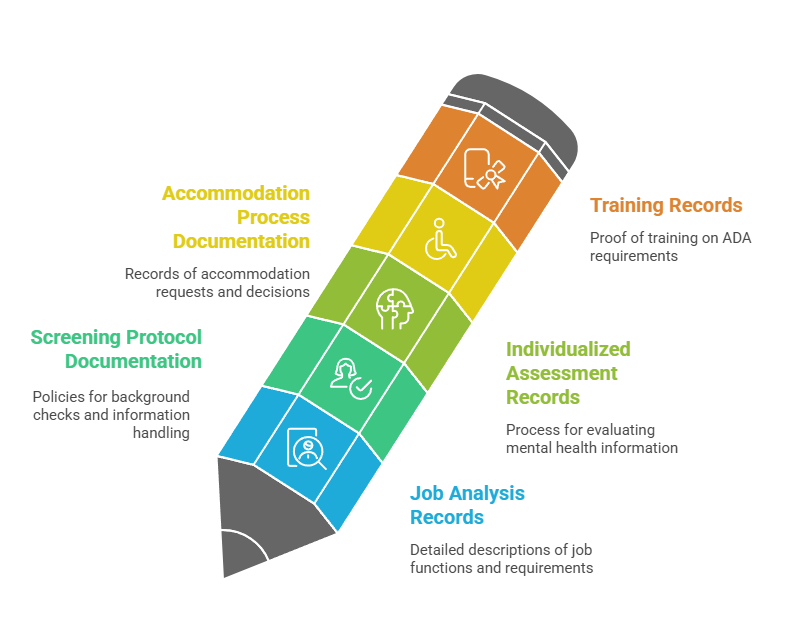Employment screening practices must balance legitimate business interests with federal protections for individuals with psychiatric disabilities, requiring HR professionals to understand nuanced ADA compliance requirements and EEOC enforcement priorities. This guide provides actionable frameworks for implementing legally compliant background check procedures that eliminate discriminatory barriers while maintaining workplace safety standards and meeting reasonable accommodation obligations throughout the hiring process.
Key Takeaways
- Mental health conditions are protected disabilities under the ADA when they substantially limit one or more major life activities, prohibiting discrimination during background screening and employment decisions.
- Employers cannot ask disability-related questions or require medical examinations before extending a conditional job offer, with limited exceptions for safety-sensitive positions.
- Background checks revealing psychiatric hospitalizations or mental health treatment cannot be used to disqualify candidates unless job-related and consistent with business necessity.
- The interactive process for reasonable accommodations must begin when employers know or should know that mental health conditions may require workplace adjustments.
- EEOC guidance prohibits blanket exclusions based on mental health history, requiring individualized assessments that consider job functions, workplace conditions, and accommodation possibilities.
- Employers face significant legal exposure when background screening vendors provide mental health information that triggers discriminatory hiring decisions, with liability extending to third-party screening practices.
- State laws often provide greater protections than federal ADA requirements, with some jurisdictions banning questions about mental health treatment history entirely during pre-employment screening.
- Documentation of accommodation denials, safety concerns, and individualized assessments is critical for defending against disability discrimination claims related to employment barriers.
Understanding Mental Health as a Protected Disability
The Americans with Disabilities Act (ADA) establishes comprehensive protections for individuals with mental health conditions throughout the employment lifecycle. These protections extend from initial application through termination decisions. Mental health disorders including depression, anxiety disorders, bipolar disorder, PTSD, schizophrenia, and other psychiatric conditions qualify as disabilities when they substantially limit major life activities. Major life activities include thinking, concentrating, interacting with others, or sleeping. These protections extend to individuals with a history of mental health conditions and those regarded as having such impairments, even if the condition is currently in remission or managed through treatment.
Employment barriers mental health considerations require employers to distinguish between lawful screening practices and prohibited disability discrimination. The EEOC reports that mental health discrimination charges have increased 28% since 2020. Background check practices represent a significant source of complaints. Understanding which employment screening procedures create unlawful barriers helps organizations avoid costly litigation. This knowledge also helps build inclusive workplaces that accommodate qualified individuals with psychiatric disabilities.
Federal law intersects with state regulations to create varying compliance landscapes across jurisdictions. California, New York, Illinois, and Massachusetts have enacted stronger protections than federal minimums. These states restrict employer access to mental health information during background screening. HR professionals must navigate these overlapping requirements while implementing consistent screening protocols. These protocols must satisfy the most stringent applicable standards.
I've interviewed candidates who demonstrated inner courage, the kind that doesn't appear on a resume. Below the polished rhetoric were the realities of coping with anxiety, depression, or PTSD and still being able to show up and perform. As human resources professionals, our job is not to diagnose but to see the person behind the forms. When we screen with empathy in accordance with ADA laws, we're not lowering our standards â we're raising the standard of humanity in hiring.
Legal Framework Governing Background Checks and Mental Health
ADA Title I Employment Provisions
The ADA prohibits discrimination against qualified individuals with disabilities in job application procedures, hiring, advancement, discharge, compensation, training, and other employment terms and conditions. Title I protections apply to employers with 15 or more employees. Coverage extends to private employers, state and local governments, employment agencies, and labor unions. The statute's broad definition of disability encompasses mental impairments that substantially limit major life activities. Amendments in 2008 expanded coverage to include episodic conditions and those controlled by medication or treatment.
Critical to background check mental health compliance is understanding the ADA's three-stage inquiry framework. During the pre-offer stage, employers cannot ask disability-related questions or conduct medical examinations. This prohibition includes inquiries about mental health treatment, psychiatric hospitalizations, or medication use. After extending a conditional job offer but before employment begins, employers may ask disability-related questions and conduct medical examinations. However, all entering employees in the same job category must be subject to the same requirements. Post-hire, disability-related inquiries and medical examinations must be job-related and consistent with business necessity.
EEOC Enforcement Guidance and Priorities
The Equal Employment Opportunity Commission issues technical assistance documents clarifying ADA compliance requirements for specific employment practices. The EEOC's 2016 guidance on arrest and conviction records established principles equally applicable to mental health information discovered during background screening. These principles include prohibiting blanket exclusions, requiring individualized assessments, and ensuring screening criteria are job-related and consistent with business necessity. Enforcement data shows the EEOC secured $17.4 million in monetary benefits for mental health discrimination claimants in fiscal year 2024. Background screening practices featured prominently in settlements.
EEOC investigations focus on whether employers used mental health information obtained through background checks to make adverse employment decisions without proper justification. The Commission examines several key factors:
- Whether organizations provided opportunities for individualized assessment
- Whether employers considered reasonable accommodations before disqualification
- Whether documented legitimate business reasons existed for candidate disqualification
- Whether policies distinguished between job-related concerns and stereotypes about mental health
Settlement agreements increasingly require comprehensive policy revisions, manager training, and ongoing monitoring to prevent future violations. These requirements make proactive compliance significantly less costly than reactive litigation defense.
Fair Credit Reporting Act Intersection
The Fair Credit Reporting Act (FCRA) regulates consumer reporting agencies and employers who use consumer reports for employment purposes. While FCRA primarily addresses credit history, criminal records, and employment verification, its disclosure and authorization requirements apply when background screening reveals psychiatric disability information. Employers must provide clear disclosure that a consumer report may be obtained for employment purposes. They must also secure written authorization before procuring such reports. Additional adverse action notice requirements apply before taking negative employment actions based on report contents.
FCRA compliance becomes particularly complex when background checks inadvertently surface mental health treatment records, psychiatric facility contact information, or disability-related explanations for employment gaps. Consumer reporting agencies face liability for including impermissible mental health information in employment background reports. Employers may face combined FCRA and ADA claims when they use such information for hiring decisions. Best practices include clear instructions to screening vendors prohibiting mental health information in reports. Organizations should also implement immediate consultation with legal counsel if such information appears in received documents.
Prohibited Employment Screening Practices
Mental health employment barriers often originate from screening procedures that directly or indirectly elicit disability information during impermissible timeframes. Understanding which practices violate federal law helps organizations redesign compliant processes. These compliant processes evaluate job qualifications without disability-based exclusions.
| Prohibited Practice | Legal Violation | Compliant Alternative |
| Asking about mental health treatment history on applications | Pre-offer disability inquiry under ADA | Ask about ability to perform job functions with or without accommodation |
| Requiring disclosure of psychiatric medications | Pre-offer medical examination under ADA | Conduct post-offer medical evaluations if job-related and applied equally |
| Requesting explanation for employment gaps suggesting treatment | Disability-related inquiry that may reveal protected information | Ask general questions about ability to meet attendance requirements |
| Background checks specifically seeking mental health records | Disability-based screening creating disparate impact | Limit background checks to job-related criminal, employment, and credential verification |
| Blanket exclusions for psychiatric hospitalizations | Failure to conduct individualized assessment | Evaluate specific job requirements and accommodation possibilities |
| Social media screening focusing on mental health disclosures | Obtaining disability information during pre-offer stage | Limit social media review to professional qualifications and public conduct |
These prohibited practices create employment barriers for individuals with psychiatric disabilities while exposing employers to discrimination claims and regulatory enforcement. The EEOC's strategic enforcement plan identifies mental health discrimination as a continuing priority. The Commission places particular focus on hiring barriers created by screening procedures.
ADA Compliance Employment Screening Best Practices

Pre-Offer Stage Protocols
Psychiatric disability employment rights are strongest during the pre-offer stage when the ADA's prohibition on disability-related inquiries provides maximum protection. Application forms should focus exclusively on whether candidates can perform essential job functions. Organizations should avoid questions about medical conditions, treatment history, disability status, or workers' compensation claims. When job descriptions list physical or mental requirements, organizations should frame inquiries around ability to perform specific tasks. This approach avoids questions about possession of particular conditions or characteristics.
Training hiring managers prevents inadvertent violations during interviews and screening conversations. Common mistakes include asking about prescription medications when discussing workplace drug policies. Other errors involve inquiring about stress management when discussing deadline pressures or requesting explanations for employment gaps that may reveal treatment periods. Instead, interviewers should describe job requirements and working conditions. They should then ask whether candidates can perform those functions or work under those conditions with or without reasonable accommodation.
Post-Offer, Pre-Employment Stage
After extending a conditional offer but before employment begins, employers have greater flexibility to ask disability-related questions and conduct medical examinations. This flexibility applies if all entering employees in the same job category undergo identical screening. This stage allows for job-related medical evaluations, psychological testing for safety-sensitive positions, and fitness-for-duty assessments. However, psychiatric disability hiring barriers remain prohibited if screening criteria are not job-related and consistent with business necessity. Barriers also remain prohibited if employers fail to consider reasonable accommodations.
Medical examinations revealing mental health conditions cannot automatically disqualify candidates without individualized assessment. The evaluation must consider specific essential functions of the position, work environment and conditions, and duration, nature, and severity of the identified condition. Assessments must also examine the likelihood that the condition would pose a direct threat to self or others and the imminence of potential harm if unaccommodated. Organizations must explore available reasonable accommodations that would eliminate or reduce risk. Decisions must be based on objective evidence rather than stereotypes or assumptions.
Reasonable Accommodation in Hiring Process
The interactive process for reasonable accommodation hiring process obligations begins when applicants or candidates disclose mental health conditions and request adjustments to application or interview procedures. Common accommodations during hiring include extended time for assessments, modified interview formats, written rather than oral responses, breaks during lengthy interviews, and quiet spaces for assessments. Employers must engage in good-faith dialogue to identify effective accommodations. Refusal is only permitted when accommodation would impose undue hardship based on significant difficulty or expense.
Mental health workplace discrimination laws prohibit retaliation against individuals who request accommodations during hiring. Organizations cannot withdraw offers, lower salary proposals, or eliminate candidates from consideration solely because they requested hiring process accommodations. When candidates voluntarily disclose psychiatric disabilities and request accommodations, employers should respond promptly with accommodation options. They should document the interactive process and evaluate qualifications based on performance with accommodations in place.
Direct Threat Assessment and Safety Considerations
Employers may exclude individuals whose employment would pose a direct threat to health or safety of themselves or others. However, this defense to disability discrimination claims requires objective evidence and individualized assessment. The ADA defines direct threat as significant risk of substantial harm that cannot be eliminated or reduced through reasonable accommodation. This definition rejects speculative concerns or stereotypical assumptions about psychiatric disabilities.
The EEOC's enforcement guidance establishes a four-factor analysis for direct threat determinations:

- Duration of Risk: Considers whether the identified threat is imminent or speculative and distant. Intermittent conditions in remission typically do not satisfy this factor.
- Nature and Severity of Potential Harm: Examines the seriousness and likelihood of injury. Requires medical documentation rather than generalized fears about mental health conditions.
- Probability That Harm Will Occur: Demands objective evidence, such as recent behavior or medical opinions. Rejects assumptions based on diagnosis alone.
- Imminence of Potential Harm: Focuses on when risk might materialize. Current stability suggests no immediate direct threat.
Reasonable accommodations must be considered even when legitimate safety concerns exist. Modifications may eliminate or substantially reduce identified risks. These accommodations might include additional supervision, modified work schedules, temporary job restructuring during treatment adjustments, or workplace support structures that address specific concerns while enabling successful employment.
State Law Variations and Enhanced Protections
While federal ADA requirements establish minimum protections, many states provide enhanced rights that create additional employment barriers restrictions for background screening practices. Understanding these variations is essential for multistate employers and organizations operating in jurisdictions with stronger mental health protections. State requirements often exceed federal minimums in coverage, privacy protections, and accommodation requirements.
| State | Key Protections Beyond Federal ADA | Background Screening Implications |
| California | FEHA prohibits discrimination based on medical condition and genetic information; stronger direct threat standards | Cannot ask about lawfully-treated conditions; requires more extensive individualized assessments |
| New York | Human Rights Law covers all employers regardless of size; prohibits discrimination based on mental disability and predisposing genetic characteristics | Extended coverage to small employers; genetic information protections |
| Massachusetts | Mental health parity laws; stronger reasonable accommodation requirements | Must consider mental health accommodations equal to physical accommodations |
| Illinois | Mental Health and Developmental Disabilities Confidentiality Act restricts disclosure | Limited access to mental health treatment records even with authorization |
| Washington | Stronger state disability law; enhanced privacy protections | Cannot access mental health records without specific showing of job-relatedness |
Organizations should audit screening practices against the most protective jurisdiction where they operate. Applying the highest standard across all locations simplifies compliance and reduces legal exposure. State laws may also provide private rights of action with different damages provisions, attorney's fee structures, and statute of limitations periods than federal ADA claims.
Documentation and Risk Management Strategies
Comprehensive documentation protects employers from ADA compliance employment screening liability by demonstrating that hiring decisions resulted from legitimate, non-discriminatory factors. Organizations should document each stage of screening processes, from job description creation through final hiring decisions. These records must establish job-relatedness and business necessity for all selection criteria.
Critical documentation components include:

- Job Analysis Records: Detailed essential function descriptions with frequency, importance, and consequences of non-performance. Documentation of work environment conditions, required skills and qualifications, and how each requirement relates to safe, effective job performance.
- Screening Protocol Documentation: Written background check policies specifying what information will be obtained, when it will be requested, and how it will be evaluated. Safeguards preventing disability information access during pre-offer stage and vendor contracts prohibiting mental health information in reports.
- Individualized Assessment Records: When mental health information appears despite protocols, document the individualized assessment process. Include specific job functions considered, direct threat analysis factors evaluated, accommodations explored, and legitimate business reasons for final decision.
- Accommodation Process Documentation: Written records of accommodation requests, interactive process discussions, and accommodations provided or denied. Undue hardship analyses and documentation that accommodation denials resulted from specific operational or financial constraints rather than general reluctance.
- Training Records: Documentation that hiring managers, recruiters, and HR personnel received training on ADA requirements. Prohibited inquiries, compliant screening practices, and escalation procedures when disability information appears unexpectedly.
Risk management extends beyond compliance documentation to proactive policy development that prevents mental health employment barriers from emerging in screening processes. Annual audits of application materials, interview guides, background check reports, and hiring decision records identify problematic patterns before they generate complaints or litigation.
Implementing Compliant Screening Programs
Organizations ready to implement or revise employment screening programs should approach compliance systematically. This systematic approach includes policy development, vendor management, training implementation, and ongoing monitoring. Beginning with comprehensive policy documentation, employers should create written procedures addressing each hiring stage. These procedures must specify how mental health protections integrate into existing background check practices.
Vendor selection and management represents a critical compliance component. Third-party screening companies must understand ADA requirements and configure services to exclude prohibited information. Request for proposal documents should require vendors to demonstrate ADA compliance capabilities. They should also describe safeguards preventing mental health information inclusion and commit to contractual liability for ADA violations resulting from improper data provision. Regular vendor audits verify ongoing compliance and identify issues before they affect hiring decisions.
Training programs should differentiate between roles and responsibilities. HR professionals who develop screening protocols need detailed instruction. Hiring managers conducting interviews require practical guidance. Individuals making final selection decisions benefit from specialized training. Scenario-based training helps participants recognize problematic situations and practice appropriate responses when disability information appears unexpectedly or candidates request accommodations. Monitoring mechanisms track compliance through metrics including accommodation request frequency and resolution, time-to-hire comparisons between candidates requesting accommodations and those not requesting adjustments, adverse action rates based on background check results, and demographic analysis ensuring screening practices do not create disparate impact on individuals with disabilities.
Conclusion
Employment barriers mental health considerations require sophisticated understanding of overlapping legal frameworks, proactive policy development, and consistent implementation across all hiring stages. Organizations that approach background check mental health compliance systematically through comprehensive policies, vendor management, documentation practices, and ongoing training significantly reduce legal exposure while building inclusive workplaces. The investment in compliant screening procedures pays dividends through reduced litigation costs, enhanced employer reputation, access to broader talent pools, and workplace cultures that support all employees. As mental health awareness increases and enforcement priorities continue emphasizing psychiatric disability rights, compliance-first approaches to employment screening represent both legal necessity and strategic business advantage for forward-thinking organizations. More than compliance, every hiring decision that is fair is in effect a statement about what kind of organization we are choosing to be. To uphold the protections of mental health is not only good risk managementâÂÂit is leadership in the most fundamental way possible. When human resources leaders uphold dignity and equality in hiring with thoughtful screening, we not only meet our obligations in the tasks, but we redefine what it means to be a responsible and humane workplace.
Frequently Asked Questions
Can employers ask about mental health conditions during job interviews?
No, employers cannot ask about mental health conditions, treatment history, psychiatric medications, or disability status during pre-offer interviews. Questions must focus on ability to perform specific job functions with or without reasonable accommodation. After extending a conditional job offer, employers may ask disability-related questions and conduct medical examinations if all entering employees in the same job category undergo identical screening. These examinations must be job-related and consistent with business necessity.
What should employers do if a background check accidentally reveals mental health information?
Employers should immediately consult legal counsel and should not use the improperly obtained mental health information in hiring decisions. Document that the information appeared despite instructions to screening vendors to exclude such data. Consider whether continuing with the same vendor is appropriate. Ensure that decision-makers base hiring choices on legitimate, job-related factors documented before the mental health information appeared.
Are psychological tests permitted during employment screening?
Psychological tests measuring personality traits or general aptitude are permitted during pre-offer screening if administered to all applicants and not designed to reveal mental impairments. Psychological tests designed to identify mental disorders or impairments are medical examinations under the ADA. They can only be administered post-offer and pre-employment, and only if job-related, consistent with business necessity, and applied to all entering employees in the same job category.
How do employers conduct individualized assessments when mental health information appears?
Individualized assessments must evaluate the duration, nature, and severity of the condition, the specific essential functions of the position, and the particular work environment. They must also consider available reasonable accommodations that would eliminate or reduce risk and current medical evidence rather than assumptions or stereotypes. Document each factor with objective evidence, engage in interactive processes to explore accommodations, and base decisions on inability to perform essential functions with accommodation or direct threat that cannot be eliminated.
What reasonable accommodations are typically provided during hiring processes?
Common hiring process accommodations include extended time for assessments and tests, modified interview formats such as written responses instead of oral presentations, and breaks during lengthy interviews or assessments. Other accommodations involve quiet spaces for testing to minimize distractions and flexibility in interview scheduling to accommodate treatment appointments. Employers must engage in interactive dialogue to identify effective accommodations and cannot refuse reasonable requests that would not impose undue hardship.
Can employers withdraw job offers based on mental health information obtained after conditional offers?
Employers can only withdraw conditional offers based on post-offer medical examination results if the withdrawal is job-related and consistent with business necessity. This applies when the individual cannot perform essential functions with reasonable accommodation or poses a direct threat to health or safety that cannot be eliminated through accommodation. Withdrawals require individualized assessment and documentation of legitimate business reasons. Blanket exclusions based on mental health diagnoses violate the ADA.
What is the difference between state and federal mental health employment protections?
Federal ADA requirements apply to employers with 15 or more employees and establish minimum protections nationwide. Many states provide broader coverage including smaller employers, stronger privacy protections for mental health information, enhanced reasonable accommodation requirements, and stricter standards for direct threat determinations. Employers must comply with the most protective law applicable in their jurisdiction.
How long should employers retain hiring records related to disability and accommodations?
The EEOC requires employers to preserve all personnel records for one year from the date of creation or the personnel action involved, whichever is later. If a charge of discrimination is filed, employers must preserve all relevant records until final disposition of the charge or action. Best practices include retaining application materials, interview documentation, background check records, and accommodation records for at least two years. Implement secure storage with restricted access for documents containing disability-related information.
Additional Resources
- ADA: Your Employment Rights as an Individual With a Disability
https://www.eeoc.gov/publications/ada-your-employment-rights-individual-disability - The ADA: Your Responsibilities as an Employer
https://www.eeoc.gov/publications/ada-your-responsibilities-employer - EEOC Enforcement Guidance on Disability-Related Inquiries and Medical Examinations
https://www.eeoc.gov/laws/guidance/enforcement-guidance-disability-related-inquiries-and-medical-examinations-employees - EEOC Guidance on Reasonable Accommodation and Undue Hardship
https://www.eeoc.gov/laws/guidance/enforcement-guidance-reasonable-accommodation-and-undue-hardship-under-ada - Department of Labor - Mental Health and Substance Use Disorders in the Workplace
https://www.dol.gov/agencies/odep/publications/fact-sheets/mental-health-substance-use-disorders-in-the-workplace - FTC Guidance on FCRA Compliance for Employers
https://www.ftc.gov/business-guidance/resources/using-consumer-reports-what-employers-need-know

GCheck Editorial Team
Meet the GCheck Editorial Team, your trusted source for insightful and up-to-date information in the world of employment background checks. Committed to delivering the latest trends, best practices, and industry insights, our team is dedicated to keeping you informed.
With a passion for ensuring accuracy, compliance, and efficiency in background screening, we are your go-to experts in the field. Stay tuned for our comprehensive articles, guides, and analysis, designed to empower businesses and individuals with the knowledge they need to make informed decisions.
At GCheck, we're here to guide you through the complexities of background checks, every step of the way.







